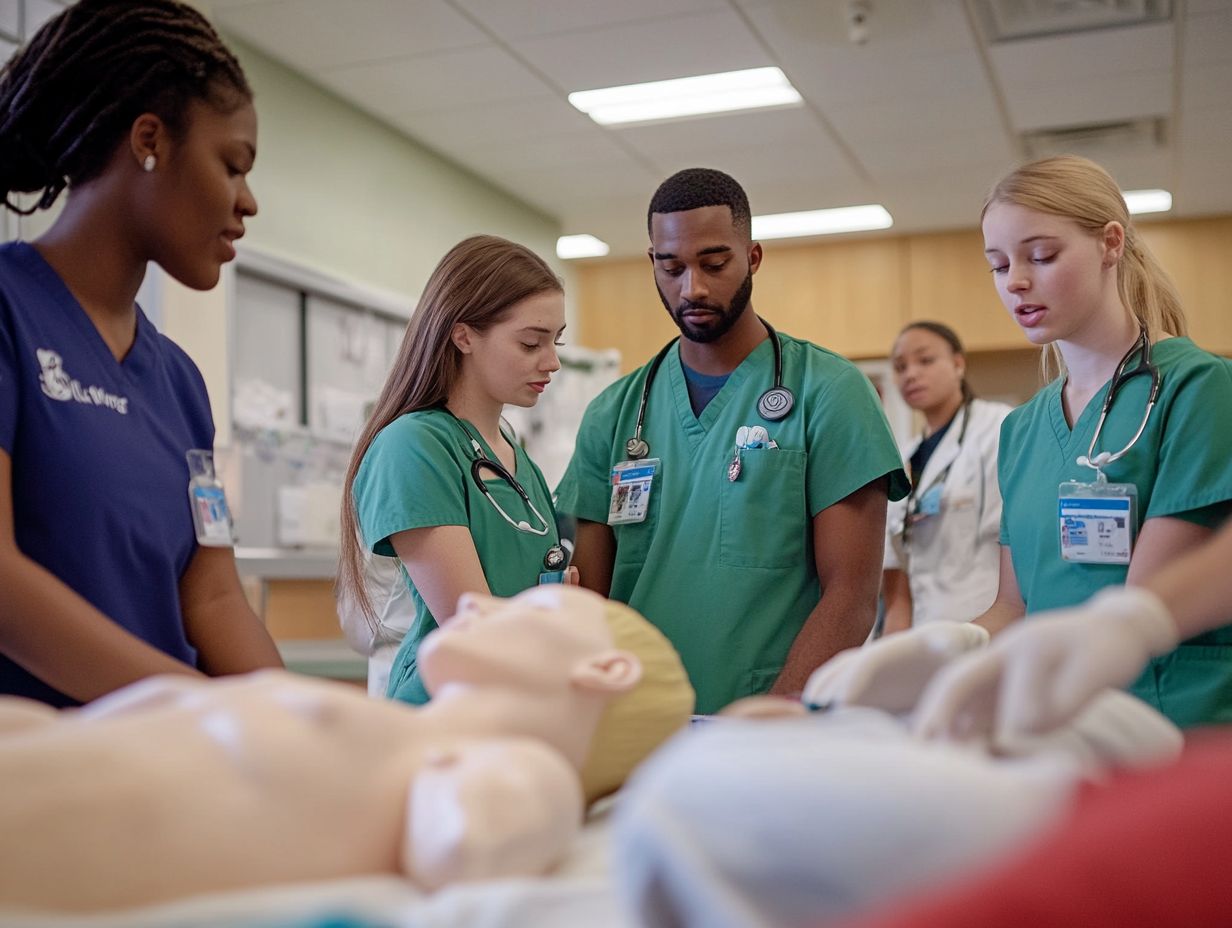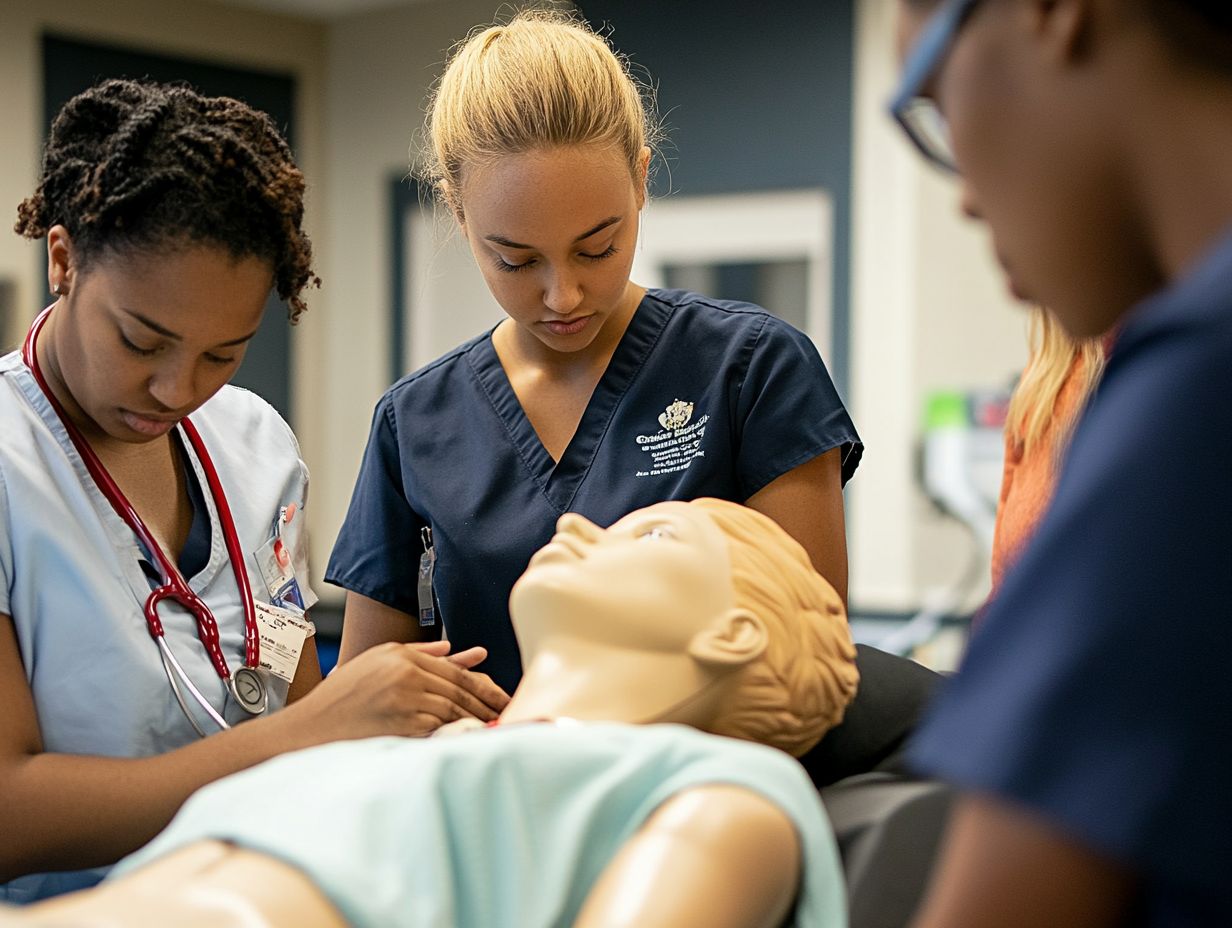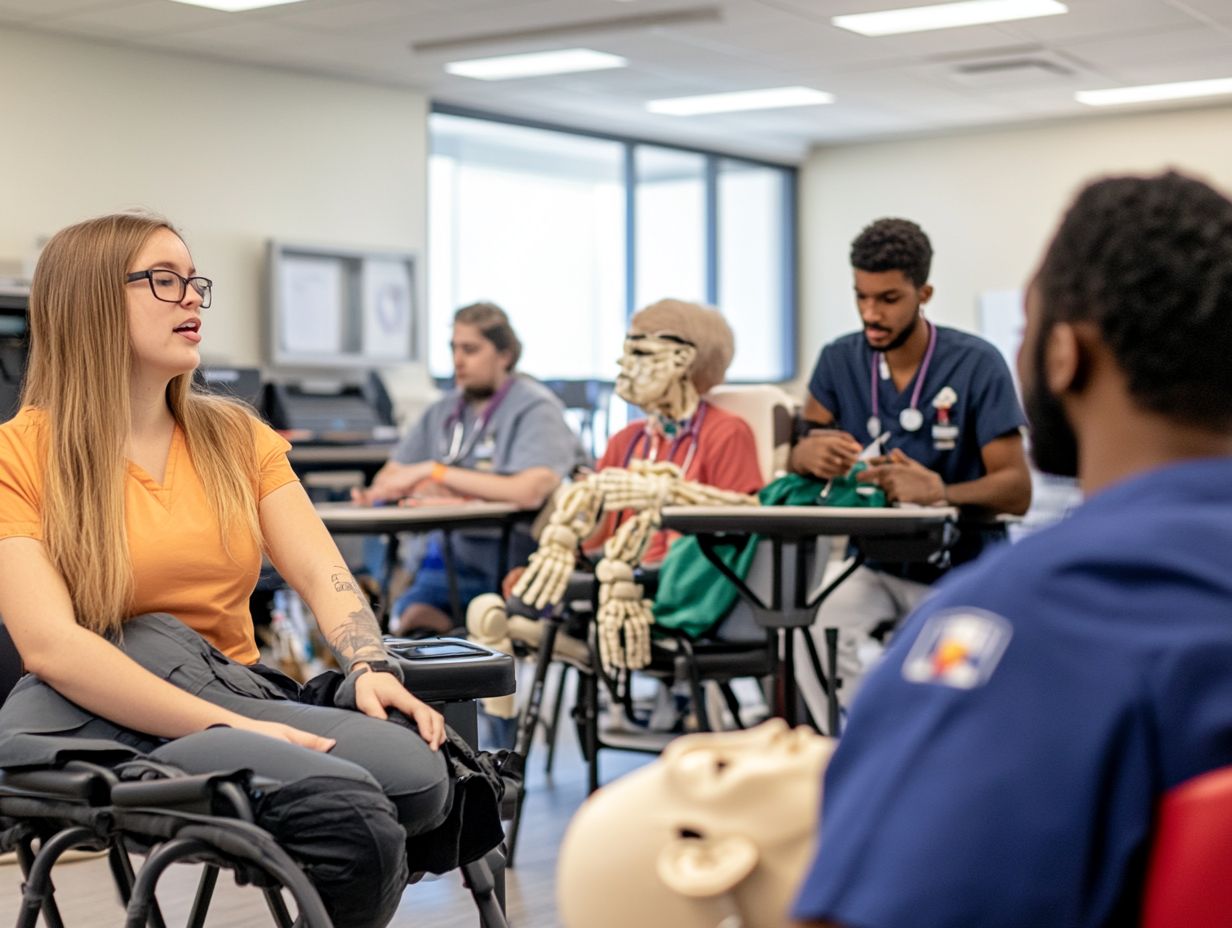The Process of Becoming a Certified Medical Assistant
In the dynamic realm of healthcare, Certified Medical Assistants (CMAs) play a pivotal role in ensuring seamless operations and top-notch patient care.
This article delves into the diverse responsibilities that CMAs undertake, ranging from essential administrative tasks to meaningful direct patient interactions.
You ll discover the critical steps to achieve certification, including educational requirements and the certification process. You’ll also find insights into the promising job outlook, salary potential, key skills, and opportunities for advancement in this fulfilling career.
Get ready to dive into exciting information!
Contents
- Key Takeaways:
- What is a Certified Medical Assistant?
- Steps to Becoming a Certified Medical Assistant
- Job Outlook and Salary Potential
- Skills and Qualities of a Successful Medical Assistant
- Advancement Opportunities for Certified Medical Assistants
- Continuing Education and Maintaining Certification
- Frequently Asked Questions
Key Takeaways:

- Becoming a Certified Medical Assistant requires completing specific education and certification requirements.
- The job outlook for Certified Medical Assistants is positive, with projected growth and potential for advancement.
- Successful medical assistants possess key skills and can advance their careers through continuing education and specialized paths.
What is a Certified Medical Assistant?
A Certified Medical Assistant (CMA) is a trained healthcare professional who connects patient care with the operational dynamics of medical facilities.
CMAs help patients while assisting physicians with clinical and administrative tasks.
Their expertise enhances healthcare delivery and elevates the overall patient experience in various settings, including clinics and hospitals.
Overview of Job Responsibilities
The responsibilities of medical assistants encompass a broad spectrum of tasks essential to healthcare operations. These professionals are often the first point of contact for patients.
They take vital signs like blood pressure and heart rate, assisting healthcare providers during examinations with precision. On the administrative side, they manage patient records, schedule appointments, and handle medical billing, contributing to a well-organized workflow.
Their skills not only enhance patient care but also play a significant role in creating a more efficient healthcare system.
Steps to Becoming a Certified Medical Assistant
Embarking on the path to becoming a Certified Medical Assistant requires several essential steps.
Your journey begins by selecting an accredited medical assistant program that offers both theoretical knowledge and practical training to prepare you for the certification exam.
As a potential candidate, you will navigate the educational landscape, often attending vocational schools or community colleges specializing in healthcare training.
Internship experience is crucial for refining your practical skills and setting you up for success in this rewarding field.
Educational Requirements
To become a Certified Medical Assistant, you must complete a medical assistant program offered by vocational schools or community colleges.
These programs cover essential topics vital for a successful healthcare career, focusing on areas like anatomy, first aid, and best practices in patient care.
You can choose from various program types, including diploma courses, associate degrees, and online learning options for working professionals. This foundation equips you with the necessary skills and opens doors to further education opportunities.
For instance, attending nursing school can deepen your understanding of holistic patient care, allowing you to transition into broader roles within the healthcare system. This solid foundation leads to improved job prospects and heightened levels of patient satisfaction.
Are you ready to take the first step toward a fulfilling career as a Certified Medical Assistant?
Certification and Licensing

Certification represents a pivotal milestone on your journey to becoming a Certified Medical Assistant (CMA) or Registered Medical Assistant (RMA). To earn these important qualifications, you must successfully pass the certification exam.
These credentials don t just showcase your expertise; they also reflect your strong commitment to the job. To achieve certification, you ll typically need a combination of formal education from an accredited program and practical hands-on training.
Certifying bodies like the American Association of Medical Assistants (AAMA) and the American Medical Technologists (AMT) set specific exam requirements, ensuring the integrity and quality of their certifications.
Securing these credentials can significantly elevate your job prospects. Employers frequently prefer or even require certified candidates, translating into enhanced recognition among your peers and greater opportunities for advancement within the healthcare sector.
Job Outlook and Salary Potential
The job outlook for Certified Medical Assistants is remarkably promising, with a projected growth trend in the healthcare industry fueled by an increasing demand for skilled professionals.
As healthcare services expand, more medical facilities are recognizing the vital contributions that talented medical assistants make in supporting physicians and enhancing patient care. This recognition translates into improved job prospects and competitive average salaries that reflect the value of this essential role.
Projected Growth and Average Salaries
Projected growth rates for Certified Medical Assistants suggest a robust demand for your skills in the healthcare sector. Average salaries reflect the increasing value placed on your expertise.
According to the U.S. Bureau of Labor Statistics, employment opportunities for medical assistants are expected to grow by 19% from 2019 to 2029 significantly faster than the average for all occupations.
This surge is primarily driven by an aging population and a rising number of healthcare facilities, particularly outpatient care centers. These centers are increasingly depending on versatile roles like yours to enhance patient care efficiency.
As for compensation, average salaries for certified medical assistants can vary widely based on your experience and location. Entry-level positions typically earn around $32,000 annually, while seasoned professionals stationed in metropolitan areas can earn upwards of $47,000, especially in specialty clinics and hospitals.
Skills and Qualities of a Successful Medical Assistant
A successful Medical Assistant embodies a distinctive combination of skills and qualities that enable you to provide exceptional patient care while effectively supporting physicians across various medical settings.
Key Attributes and Abilities
Key attributes that define effective medical assistants include strong communication skills, adaptability to ever-changing environments, and the proficiency to handle both clinical duties and administrative responsibilities.
These qualities facilitate seamless collaboration with healthcare teams and foster a positive atmosphere for patient interactions. For instance, when you encounter an unexpected medical situation, an adept medical assistant can swiftly organize the necessary resources while keeping the patient informed and calm, thereby exemplifying exceptional teamwork in a high-pressure environment.
Your problem-solving skills and critical thinking enable you to address issues promptly, whether it s efficiently managing scheduling conflicts or responding to patient concerns. Ultimately, these attributes significantly enhance the overall healthcare service delivery, ensuring that patients receive timely and efficient care.
Advancement Opportunities for Certified Medical Assistants

As a Certified Medical Assistant, you have a wealth of advancement opportunities at your fingertips within the healthcare field. This role opens doors to countless career paths and specializations that can significantly enrich your professional growth and elevate your job satisfaction.
Are you ready to take the next step in your medical assistant career? Don t miss out on the growing opportunities in this field!
Possible Career Paths and Specializations
Many career paths and specializations await Certified Medical Assistants, spanning from administrative positions to advanced clinical roles.
If you want to elevate your career, consider becoming a medical office manager or a healthcare administrator. These exciting roles let you run daily operations, ensure compliance with regulations, and manage staff leading to better job satisfaction and higher earnings.
Specialized medical assistant roles in areas like cardiology or orthopedics present unique chances to support patient care in focused settings.
Going back to school in these specialties sharpens your technical skills and showcases your commitment to professional growth, making you a more competitive candidate in the job market.
Continuing Education and Maintaining Certification
Continuing education and maintaining certification are vital elements of a flourishing career as a Certified Medical Assistant. By prioritizing these pursuits, you ensure that you remain well-informed about the latest advancements and best practices in the healthcare field, positioning yourself as a knowledgeable and capable professional.
Requirements and Benefits of Continuing Education
The requirements for continuing education mean you’ll need to complete a specified number of hours dedicated to training or coursework that focuses on pertinent healthcare topics. These hours are often mandated by certifying bodies to ensure you stay current with the latest practices and innovations in the healthcare sector.
Your coursework could cover subjects like patient care techniques, medical terminology, and office management strategies.
You’ll find a variety of learning formats available, ranging from traditional classroom settings to online courses and workshops, providing the flexibility you need to fit it into your busy schedule.
Continuing your education not only hones your skills but also significantly enhances your job performance and prospects. This effort helps you stand out in a competitive job market while deepening your understanding of your essential role in patient care.
Frequently Asked Questions
How can you become a Certified Medical Assistant (CMA)?

The process of becoming a CMA involves completing an accredited medical assisting program, passing a certification exam, and meeting any state-specific requirements.
What are the educational requirements for becoming a CMA?
To become a CMA, you must have a high school diploma or equivalent. It is also recommended to complete a postsecondary medical assisting program.
How long does it take to become a CMA?
The length of time it takes to become a CMA can vary depending on the program you choose. Most programs take between 9 months to 2 years to complete.
What is the certification exam for CMAs?
The certification exam for CMAs is the Certified Medical Assistant (CMA) exam, which is offered by the American Association of Medical Assistants (AAMA).
What are the benefits of becoming a CMA?
- Fulfillment in a rewarding healthcare career.
- Job stability.
- Competitive salary.
- Opportunities for advancement.
Are there any recertification requirements for CMAs?
Yes, CMAs are required to recertify every 5 years by completing continuing education credits or retaking the certification exam. This ensures that CMAs stay up-to-date on industry changes and advancements.
Ready to embark on your journey as a CMA? Start today!






